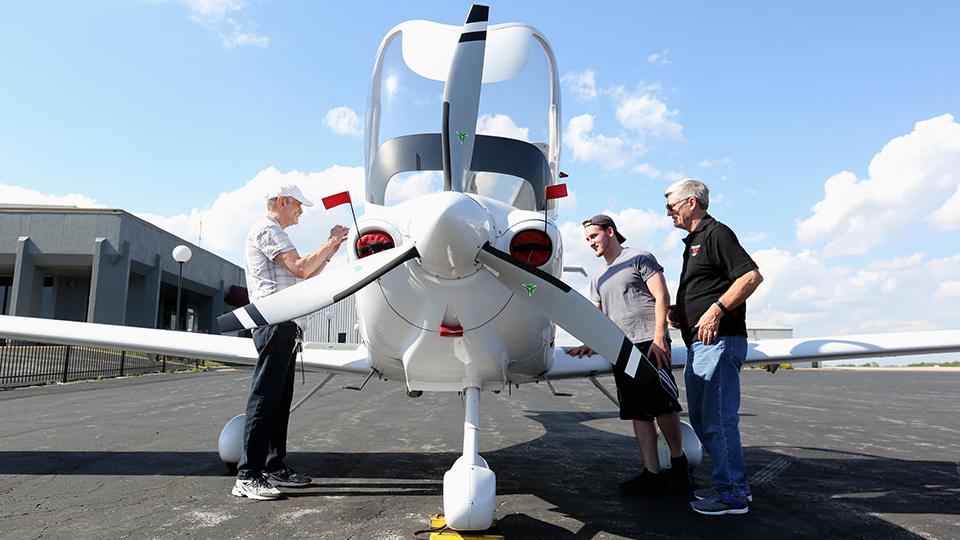Classes perfect for those interested in earning a private pilot certification — or who want to learn how to be an effective private plane passenger.

About JCCC Continuing Education Aviation Ground School
JCCC offers a variety of courses for the aspiring pilot or seasoned enthusiast. Our courses are designed to meet the needs of the private pilot community.
Aviation Ground School courses
This introduction class provides an overview of the aviation industry and what to expect when pursuing a pilot license. Participants will learn the different recreational and professional paths to becoming a pilot. We will also explore other careers available in the field of aviation, including aviation maintenance, avionics, air traffic controlling, and more. This class provides a great overview of the industry and what to expect when pursuing a pilot license.
A Private pilot certificate is like a driver’s license, it allows you the freedom to fly anywhere in the United States. You can carry passengers, and you can even share certain operating expenses with your passengers. Although, there are currency and medical requirements to make sure you stay proficient and healthy, only a few other factors affect when and where you can fly. Airplanes are readily available for rental once you obtain a pilot certificate or you may even consider joining a flying club or owning your own airplane.
To become a Private pilot you must:
- Be 16 years old to solo.
- Be 17 years old to receive your pilot certificate.
- Read, speak, and understand English.
- Hold at least a third-class medical certificate or basic med
Training toward a pilot certificate is done in two steps.
-
- Step 1 is obtaining the training in the aeronautical knowledge areas required of a Private pilot. This knowledge is tested through an exam taken on a computer (similar to the driver’s license examination).
- Step 2 is receiving the hands-on flight training to gain proficiency in the piloting skills required of a Private pilot. These skills are then tested by an examiner in the airplane (the practical test) and your pilot certificate is issued.
Begin your journey today by taking our private pilot ground school course to prepare you to sit for your aeronautical knowledge exam as a private pilot. JCCC offers small in-person classes that are completed over about 5 weeks.
We suggest completion of a private pilot course before starting training for your instrument rating. This is a far more complex endeavor and a pilot needs to go through an instrument rating ground course to get a feel for that complexity.
Instrument rating covers all the subject areas that you need to know in order to pass your FAA Instrument Rating knowledge test and become a safe & smart pilot. The Instrument Rating Ground School is designed for the traditional learner who enjoys in-person, instructor-led classes.
This course will show participants how to use the Electronic Flight Bag (EFB) for preflight planning, flight planning, route optimization, and as an in-flight resource. ForeFlight Basics is designed for the new or casual user seeking a hand-on introduction to Foreflight and to enable them to utilize the EFB for flight planning and in-flight resource management.
This course will provides hands-on application of advanced features of ForeFlight. ForeFlight Advanced is designed for experienced users and instrument pilots to enable them to utilize advanced features for flight planning and in-flight resource management.
Weather is one of the primary causes of accidents in general aviation. Incorporating new tech into your weather planning can provide a greater understanding of weather and enhance hazard avoidance. Learn how to make practical, real-world use of weather information to interpret weather data accurately so you can form a mental picture of the conditions affecting your flight.
Understand the dynamics of fog, ice, thunderstorms, pressure patterns, and frontal systems so you can predict and plan for local conditions. Know how to accurately plan your fuel, so you always land with adequate reserves—even in the strongest headwinds. This course provides an in-depth look at available weather resources including Flight Service, the internet, and popular electronic flight bags (EFBs).
This class is designed to help non-pilot flying companions learn how to safely land an aircraft in the unlikely event of pilot incapacitation. It includes an introduction to the principles of flight, a basic overview of instruments and radio communications, and scenario-based training.
While flying is, statistically, one of the safest ways to travel, there are times when things go wrong. And sometimes they go very, very wrong.
This course will explore aviation accidents that changed the aerospace and aviation industries for the better. These tragic events led to widespread reforms in thinking and design, and their influence is felt each time you step into a plane.
- Aviation coursesRegister now

